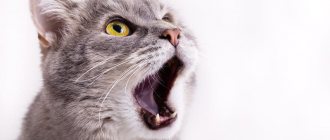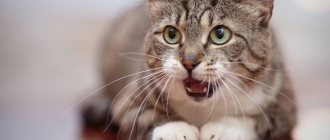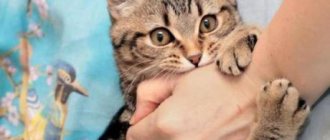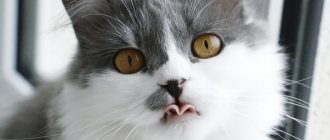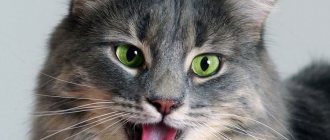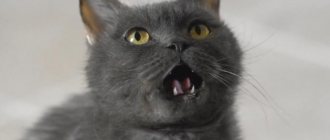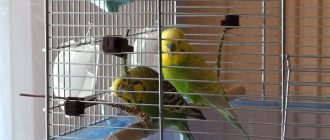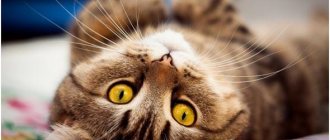If a cat is breathing with its mouth open, there may be natural physiological or pathological reasons for this. Conditions in which a cat suffocates are poisoning, overheating, injuries to internal organs, neoplasms or a foreign body in the nasopharynx, allergies, diseases of the heart and respiratory system. The owner must know what alarming symptoms are and be able to provide first aid. A veterinary clinic specialist will conduct a diagnosis and determine the reason why the cat is sticking out its tongue.
According to veterinarian statistics, 10% of cats with breathing problems are diagnosed with cardiovascular diseases.
Why does a cat breathe through its mouth?
The reasons why a cat opens its mouth and breathes like a dog with its tongue hanging out are:
- Physiological, when rapid breathing is caused by natural processes in the body.
- Pathological, in which the cat breathes with its mouth open due to illness or injury.
Physiological reasons
A cat breathes through its mouth under the following circumstances:
If the female is expecting offspring, then such a symptom is a sign of imminent delivery.
- Physical exercise. In kittens and adult cats, the frequency of breathing increases after too active games or running. When a pet runs, a lot of energy is consumed and all organs begin to function faster. The body needs an increased amount of oxygen, since cats do not know how to accumulate it. Therefore, if the cat has been running, it breathes quickly and its tongue sticks out.
- Dream. During the deep sleep phase, all the cat’s muscles relax, including the maxillofacial muscles. This causes the jaw to drop and the tongue to stick out. The Maine Coon sleeps so often, which is considered a feature of the breed. If a cat sleeps with its tongue hanging out and makes a sound, this is natural. Kittens sleep and show their tongues because they have a strong sucking instinct.
- Pregnancy and childbirth. If a pregnant cat breathes through her mouth, this means that the fetuses are pressing on the diaphragm and it is difficult for her to breathe. Mouth breathing indicates the beginning of contractions. The female walks restlessly, meows, and looks for a comfortable place. If heavy breathing appears after childbirth, this may be the onset of eclampsia and the animal needs emergency veterinary care.
- Stress. Adrenaline is released into the blood, causing the heart to work harder and breathing to increase.
- Death. In a state of agony, the cat sticks out its tongue and often breathes through its mouth. When a pet dies, the heart begins to contract worse, causing hypoxia.
Pathological factors
Poisoning
A smoking owner with his bad habit can provoke such a manifestation of smoke poisoning in his pet.
If a cat is breathing heavily and opens its mouth slightly, this may indicate that toxic substances have entered the body: alkalis, acids, rodent poisons, household chemicals, medications that the pet accidentally swallowed. A cat can also be poisoned by gas, combustion waste, even nicotine if the owner smokes a lot indoors.
Overheating
In hot weather, animals often overheat, especially if the owner leaves the pet in the car or on a closed balcony. Most often, long-haired cats suffer - Persian, Angora, Siberian. Hairless breeds also overheat and stick out the tip of their tongue. Therefore, in the summer, you should purchase a cooling mat for your pet.
Internal organ injuries
This is a deadly condition in which there may be no external changes. The cat pulls out its tongue and begins to breathe through its mouth after a fall from a height, a car injury, broken ribs, a ruptured diaphragm, or traumatic brain injury. With such pathologies, pulmonary edema often develops, which often provokes death. And also a protruding tongue indicates an accumulation of fluid in the pleural area.
Polyps in the nasopharynx or foreign body
A cat breathes heavily with its mouth open if there are polypous processes in the nose and nasal inhalation is difficult. Polyps grow, occupying the space of the nasopharynx, which is why the cat wheezes and the mouth opens even in sleep. Small objects that the animal sniffs also accidentally get into the nasal sinuses. A foreign body sometimes gets stuck in the throat (fish bones, fragments of toys).
Allergic reaction
If a cat constantly sticks out its tongue, watery eyes, itchy skin, swelling of the throat or mucous membranes appear, this is the immune system’s response to the allergen. The level of histamine increases, which dilates blood vessels, causing respiratory activity to become more frequent. Main agents:
- nutritional supplements;
- household chemicals;
- cosmetics for cats and people;
- medicines;
- dairy products;
- helminths and skin parasites.
Diseases of the heart and respiratory system
The cause of this pathology may be helminths - heartworms.
The cat's tongue sticks out and difficulty breathing occurs with cardiomyopathy, when the structures of the organ thicken, disrupting coronary blood flow. Dirofilariasis is dangerous, in which worms are localized in the cavity of the heart. Often, a cat breathes through its mouth due to pathologies of the respiratory system - pneumonia, bronchitis, pulmonary thromboembolism, laryngeal stenosis.
Animal Treatment Options
In most cases, the best option would be to urgently hospitalize your furry. There is no need to try to cure a tailed cat at home. By trying to help the poor cat on their own, the owners are only stalling for time and making the situation worse.
After giving birth, a cat often breathes with its mouth open
Contacting a veterinarian
When contacting a veterinary clinic with complaints of unnatural breathing of a pet, the doctor will prescribe the following tests:
- ECG of the heart;
- Ultrasound of the heart;
- blood test (general, biochemistry, for infections: herpes, rhinotracheitis, etc.);
- fluoroscopy;
- consultation with veterinarians: oncologist, dentist and surgeon;
- bronchoscopy;
- rhinoscopy.
The list of studies is impressive, but despite this, loving and responsible owners will do everything necessary to ensure that the four-legged disease is diagnosed on time. This will increase the chances of a speedy recovery for your pet and its return to its former carefree cat life. Therefore, at the slightest suspicion of illness in your tailed friend, you must call a doctor at home or take the cat to the hospital.
Note! An exception is if a foreign body enters the nasopharynx. In this case, you need to save your pet very quickly. If you know the sequence of actions, even a person without a medical diploma can help an animal.
If a foreign object is stuck in your pet's nose, to provide first aid you need to open the cat's mouth wide, then pull his tongue and try to stick the object out with tweezers. If he ends up in the trachea, you need to follow these steps: turn the cat over, then lift him by the hind legs and gently press his stomach in the diaphragm area. After such manipulations, the foreign object should jump out. But if this does not happen, the cat must be urgently transported to the veterinary clinic.
What to do if a cat pulls out its tongue?
A sufficient volume of water is an important condition for improving the condition of the animal when overheated.
When a cat sticks out its tongue due to a foreign body, it should be carefully removed. The object is pulled out with tweezers. If a foreign object has moved strongly into the trachea, the animal should be turned upside down with its hind legs and shaken a little. If the cat overheats, place it in a cool place and give it plenty of water. In other cases, emergency veterinary care is always required.
Stress
The cause may be stress in cats. We will look at the symptoms and treatment below.
If the pet is stressed, the tongue will stick out. For example, when driving a car, if the cat is afraid, then the tongue will hang out the whole way. Fear, nervous shock, negative emotions are the reasons that cause stress in cats. When an animal is nervous, the following symptoms appear:
- tongue sticking out;
- the cat is shaking;
- the pet is trying to hide;
- meows constantly.
If the cat is scared, the symptoms may recur. Therefore, the animal requires treatment. He needs to be provided with complete rest. If necessary, the veterinarian will prescribe sedatives.
Pathological conditions
Does your cat have rapid and heavy breathing, does her tongue stick out, does she gasp for air greedily? The listed symptoms are typical for oxygen starvation. Fleeing from it, the animal instinctively swallows more air. Prolonged hypoxia is detrimental to his health.
There are other pathological conditions accompanied by similar symptoms:
- Foreign body. Getting into the respiratory system with food or during play, it limits or blocks the access of air to the lungs and internal organs.
- Ulcers, inflammation, and other damage to the mucous membrane of the larynx.
- Cold, viral infection. During illness, mucus accumulates in the nose and throat, making normal breathing difficult.
- With pneumonia, swelling or injury to the lungs, or pulmonary failure, breathing is difficult. Pulmonary pathologies are dangerous due to their rapid progression and possible death. There is a high risk that the pet will fall into a coma and not come out of it.
- A domestic cat periodically sits with its tongue hanging out and breathes with an open mouth if injured ribs are compressing the lungs. Due to compression, the volume of the lungs decreases - the body feels an acute lack of oxygen.
- Brain pathologies, traumatic brain injuries, intoxication, heart and vascular diseases.
Heart failure
Heart failure is a serious pathology that requires urgent consultation and treatment at a veterinary clinic. The group of cardiac pathologies includes:
- hypertension;
- hypotension;
- angina pectoris;
- cardiac ischemia.
A predisposition to heart pathologies exists in representatives of the following breeds:
- Maine Coon;
- Scottish lop-eared;
- sphinx;
- Abyssinian;
- Cornish Rex.
It is important for their owners not to miss the first symptoms of the disease, among which is a protruding tongue. If it is accompanied by rapid “dog breathing”, lethargy and impotence, there is cause for concern
Inhalations accompanied by pain, irregular rhythm and cyanosis of the mucous membranes are symptoms that require immediate medical attention.
Poisoning
Intoxication of the body is often accompanied by disruptions in the functioning of the respiratory system and heart. Toxic substances relax the muscles so much that the animal cannot control them. For this reason, the cat's tongue hangs out.
Poisoning can be determined by the accompanying symptoms:
- spasm;
- vomit;
- foam at mouth;
- shaky movements.
Respiratory failure
Respiratory failure accompanies many serious pathologies. You can diagnose it yourself by wheezing, jerky inhalations and exhalations, and intermittent breathing.
An animal without qualified assistance may suffocate.
Muscle atrophy
Muscle atrophy occurs after injuries, jaw dislocations, and pinched nerves. When an injury occurs, it is difficult for a cat to close its mouth, and swelling forms at the site of the injury. A pinched nerve is accompanied by pain when chewing and swallowing food and other jaw movements.
If the cat's mouth is open for a long time and the tongue is visible, the owner needs to touch its tip and the upper palate with a finger. In healthy individuals, a natural reflex will work and they will close their mouth. Otherwise, a pathology cannot be ruled out, which can be accurately diagnosed by a veterinarian.
Muscle atrophy is not always the result of injury or external influences. One of the reasons is the destruction of articular tissues caused by metabolic disorders or congenital diseases.
In any case, you need to show your pet to a specialist.
- Asthma in cats: symptoms and treatment
- Heart attack in cats
- Rhinotracheitis in cats and kittens
Pathological causes
It happens that owners observe breathing problems in their cat for quite a long time. However, the factors from the above list are absent. Why, in this case, can the cat breathe heavily, often, sticking out its tongue? Here are the most common dysfunctions in which this symptom appears:
- a foreign body that has entered the respiratory tract and blocked the air supply;
- painful lesions of the oral mucosa (mechanical damage, ulcers, rashes, fistulas, inflammation);
- ARVI and similar ailments, in which mucus accumulates in the nose and other parts of the respiratory tract (oxygen is not easy to reach its destination, and the cat breathes with its tongue sticking out to get more air);
- lung pathologies (inflammation, edema, tumor, pulmonary failure);
- cardiovascular diseases (angina pectoris, coronary artery disease, hypotension, hypertension);
- injuries to the ribs and muscles in the area of the lungs, as a result of which the latter are compressed, their volume decreases, the body does not have enough oxygen, so the cat breathes with its tongue hanging out;
- dysfunction of the brain, namely the part of it that is responsible for breathing;
- poisoning, in which the general condition of the body leaves much to be desired, and malfunctions in the functioning of almost all systems are observed.
Cats stick out their tongues like dogs and breathe heavily, frequently, trying to take in more air when the body is starved of oxygen. The animal instinctively tries to escape from hypoxia, which is destructive for it. If this condition continues for a long time, the pet may even die.
Therefore, if you notice that your cat is breathing abnormally—opening its mouth wide and sticking out its tongue—you need to show it to the doctor as soon as possible. He will prescribe an examination and then select adequate treatment methods. Amateur action in this case is unacceptable - the risk of losing a pet is too high.
Why does a dog always keep its tongue hanging out of its mouth?
This is not a very important question. Why don't I see other animals with tongues sticking out? This happens under certain conditions. For example, people breathe heavily after heavy exercise.
Kangaroos and felines lick their bodies to remove saliva. Loss of saliva actually means a lack of water in the body. The next time you see your dog tongue-tied, provide him with plenty of water. You may also consider reducing his exercise period. In addition, the dog does this when it is hot or running away from some other animal, as well as immediately after exertion and emotional stress.
Pulmonary edema in a cat
Pulmonary edema is a condition in which the level of fluid in the lungs is higher than normal. Blood plasma leaves the vessel and fills the intercellular pulmonary space. The lungs increase in size, but can no longer fully perform their direct function.
The reason for oxygen starvation during edema is that with each breath, the accumulated liquid tends to foam. From one milliliter of such liquid, about 15 milliliters of foam are obtained.
As it accumulates, it fills the airways and significantly increases the load on the respiratory muscles. The oxygen that enters the lungs simply does not reach the alveoli, mixing with foam bubbles. As a result, respiratory failure progresses.
Specifics of diseases of purebred cats
In some purebred animals, as well as their mixed breeds, edema can be caused by heart failure. If we talk about breeds, the most predisposed are Scottish Fold, Oriental and Abyssinian cats, Sphynxes, Cornish Rexes and Maine Coons.
Symptoms of pulmonary edema in cats and kittens
Video about the symptoms of pulmonary edema in cats and dogs
As for clinical symptoms and manifestations, at first there is lethargy, complete or partial loss of appetite, and decreased activity of the cat. Over time, anxiety, shortness of breath (the cat breathes through its mouth), and tachycardia appear. Lack of oxygen causes cyanosis of the mucous membranes.
More severe conditions are accompanied by wheezing, initially dry, then wet. White foam appears from the nose and mouth, sometimes mixed with blood. Coordination and heart rhythm are impaired. The outcome of respiratory failure can be a hypoxemic coma, as a result of the death of brain cells due to lack of oxygen and the death of the animal, if it does not occur earlier due to the severity of the condition.
Frequent, difficult breathing through the mouth and cyanosis (blue color of the oral mucosa) require urgent treatment at the hospital for examination by a veterinarian. Since the reason that caused this condition can threaten health and even life.
Diseases in which the tip of the tongue protrudes
Respiratory diseases
Breathing through an open mouth, protruding the tip in combination with shortness of breath and wheezing are signs of illness or pulmonary edema.
You should also be wary if a cat breathes like a dog, since this type of breathing is not typical for it.
This condition requires emergency veterinary attention.
Cardiovascular failure
If the cat is breathing heavily with its mouth open after physical activity, and the tip may stick out and acquire a bluish tint, this signals the development of heart failure. The animal requires examination by a veterinarian, who will help identify pathologies at an early stage of development.
If the tip of your cat's tongue sticks out, there can be many reasons for this.
Poisoning
When an animal is poisoned, vomiting occurs, which leads to a condition where the vomiting center is irritated. The cat begins to breathe frequently, cough and stick out its tongue.
Stress
In a stressful situation, the animal licks, protrudes and breathes like a dog. This is natural animal behavior.
Infectious diseases
Serious infectious diseases, such as rhinotracheitis, calcivirosis, are accompanied by fever, sneezing and runny nose, which causes protrusion. Calicievirosis is distinguished by ulcers on the animal's tongue and discharge from the nose. Ulcers in the mouth, salivation, and nasal discharge accompany the disease rhinotracheitis. Flat-faced cat breeds – Persians – are especially susceptible to it.
Inflammation in the mouth
Inflammatory processes in the mouth, its mucous membrane, can push the purr to stick out its tongue to relieve pain. Such symptoms occur with stomatitis.
Abyssinian cats are susceptible to gingivitis.
The main cause of gingivitis is poor diet and lack of oral hygiene.
To avoid oral problems, cats need to have their teeth brushed every one to two weeks. The kitten must be accustomed to this procedure after three to four months.
Increased body temperature
Cats, like dogs, regulate their body temperature by sticking out their tongue. But, if for canines this behavior is natural thermoregulation, then for cats, a protruding tongue in the heat indicates overheating and dehydration. The animal is close to suffering from heatstroke and needs help. It is worth moving it to a cool place, ventilating the room and giving it water. Long-haired cats need to be trimmed during the summer.
It happens that a cat sticks out the tip of its tongue and freezes for a while in this position.
Functional brain disorders
Cats are prone to nervous disorders. Alarming symptoms include: convulsions, strabismus, protruding, urinary and fecal incontinence. A fallen tip is also one of the signs of a pet's imminent death.
Pathological causes
It happens that owners observe breathing problems in their cat for quite a long time. However, the factors from the above list are absent. Why, in this case, can the cat breathe heavily, often, sticking out its tongue? Here are the most common dysfunctions in which this symptom appears:
- a foreign body that has entered the respiratory tract and blocked the air supply;
- painful lesions of the oral mucosa (mechanical damage, ulcers, rashes, fistulas, inflammation);
- ARVI and similar ailments, in which mucus accumulates in the nose and other parts of the respiratory tract (oxygen is not easy to reach its destination, and the cat breathes with its tongue sticking out to get more air);
- lung pathologies (inflammation, edema, tumor, pulmonary failure);
- cardiovascular diseases (angina pectoris, coronary artery disease, hypotension, hypertension);
- injuries to the ribs and muscles in the area of the lungs, as a result of which the latter are compressed, their volume decreases, the body does not have enough oxygen, so the cat breathes with its tongue hanging out;
- dysfunction of the brain, namely the part of it that is responsible for breathing;
- poisoning, in which the general condition of the body leaves much to be desired, and malfunctions in the functioning of almost all systems are observed.
Cats stick out their tongues like dogs and breathe heavily, frequently, trying to take in more air when the body is starved of oxygen. The animal instinctively tries to escape from hypoxia, which is destructive for it. If this condition continues for a long time, the pet may even die.
Therefore, if you notice that your cat is breathing abnormally—opening its mouth wide and sticking out its tongue—you need to show it to the doctor as soon as possible. He will prescribe an examination and then select adequate treatment methods. Amateur action in this case is unacceptable - the risk of losing a pet is too high.
Causes of night teeth grinding
As you know, a completely natural reaction to discomfort in any person, regardless of age, is often an involuntary clenching of the jaw. This is facilitated, among other things, by an increase in the tension of the masticatory muscles. As a rule, teeth grinding can be observed both during the day and at night, during sleep, and its causes can be very diverse:
- complex psychological stress;
- stress experienced - in the form of problems at home and at school, relationships with friends, etc.;
- incorrect daily routine - watching TV shows in the evening, uncontrolled games on a computer or tablet, lack of sleep and shallow sleep;
- inflammation in the nasopharyngeal segment - adenoids, sinusitis, rhinitis, causing muscle spasms;
- period of growth of permanent teeth - very often children have memories of the itching their gums experienced during the cutting of milk teeth, so involuntary grinding of the jaws occurs;
- presence of problems with bite or jaw structure;
- withdrawal from breastfeeding, or refusal of the pacifier - the lack of a habitual attribute contributes to the fact that the baby constantly holds his finger in his mouth, bites his lips, grinds his jaws;
- heredity of bruxism;
- the child eats little solid food - when the baby tries to eliminate tension in the facial muscles.
Teeth grinding is also quite common in hyperactive children. In addition, other reasons of a secondary nature can be noted:
- insufficient amounts of calcium and magnesium in the body, leading to cramps of the facial muscles;
- the possible presence of helminths, although modern medicine considers this a relic of the past;
- the presence of braces or poorly placed fillings - anything that causes mechanical discomfort.
Detailed overview of possible problems
If an adult cat is breathing heavily with its tongue hanging out, then this is a serious signal to the owner to take his pet for a detailed examination. Especially if this condition occurs during the cold season. Additional symptoms may also include grunting, sniffling and whistling while breathing at rest. In some cases, shortness of breath may be observed even with minimal physical exertion, and increased salivation will once again confirm serious malfunctions within the animal’s body. The veterinarian will necessarily consider the following possible pathologies:
Asthma. It occurs to varying degrees of severity in cats of all ages. Most often it is detected in the first year of an animal’s life, but there are many cases where pregnancy or injury could activate the process even in adult pets. At the initial stage, symptoms may be barely noticeable and appear only after intense physical exertion or during the hot season. Subsequently, the cat begins to breathe heavily with its tongue hanging out, and a cough may appear. Lethargy and lack of appetite may be associated with shortness of breath and other breathing problems. The diagnosis is made on the basis of a lateral X-ray of the lungs and a clinical blood test, where an increased number of eosinophils will be detected. Treatment will largely depend on the severity of symptoms. In most cases, asthma occurs more than once during a lifetime, and in animals that experience attacks more than 2-4 times a year, hormonal therapy and glucocorticoids are prescribed throughout their lives. Heart pathologies. There are breeds (Maine Coons, Persians, Exotics, Sphinxes) that have a congenital predisposition to heart defects, which in most cases appear in the first year of life. You can suspect heart problems in an animal by shortness of breath, which can be observed even at rest, paroxysmal cough and blue discoloration of the mucous membranes of the mouth. It is especially dangerous when the cat breathes with its mouth open and tongue hanging out without any provoking factors. Cardiac pathologies can be excluded or confirmed using ECHO. Treatment in each case is individual, depending on the severity of the symptoms. In most cases, heart defects require lifelong care for your pet, not only medically, but also behaviorally (exclusion of physical activity, proper nutrition, etc.). Heatstroke. It is more common in dogs, but cats that travel by car are also at risk. Animals can tolerate even the most extreme air temperatures, provided they have the opportunity to find a cool place. If your pet is locked in a car, even on a not-so-hot day, there is a risk of heatstroke. If, after a long stay indoors in extreme heat, the cat is breathing with its tongue hanging out, its coordination of movements is impaired, vomiting and diarrhea are observed, then you should immediately take the animal to the nearest veterinary clinic to provide the necessary assistance. Some owners try to cool their pet on their own, but this is very dangerous, so you need to be careful and stop in time (we are talking about applying cold to the hips and paw pads). Even if the temperature has completely returned to normal, it is better to show the cat to the veterinarian to exclude possible complications in the future. And remember that you can only provide first aid if you are sure that the animal has heatstroke, and not pulmonary edema or other pathologies associated with the heart or respiratory tract. Pulmonary edema. Very common in chronic heart failure and after serious injuries received in accidents or falls from great heights. If the cat is breathing with its tongue hanging out or is acting restless (and this has never been noticed before), then it is recommended to take it to the veterinary clinic for an x-ray. If pulmonary edema is confirmed, an oxygen chamber and intravenous injections may be needed
But it is important to remember that relieving edema without eliminating the root cause that provokes it does not make sense.
In conclusion, I would like to remind you that large cats after physical exertion or during the hot season can breathe with their mouths open and their tongue hanging out. But, at rest, even in the largest pets, heavy breathing should be alarming.
Heat
The main physiological reason why a cat sticks out its tongue is temperature regulation. The animal protrudes the organ to reduce discomfort, for example, during heat. This prevents the development of heat stroke. In this case, the owner should take the cat to a cool place and pour water on it.
But a cat's tongue sticking out can also be a signal of high body temperature. To understand whether your pet is suffering from heat or is sick, you need to figure out what temperature is considered normal in cats.
The normal temperature for a cat is 38-39 degrees. But don’t panic right away if the indicator deviates slightly from the norm. Here are the common reasons for the thermometer to shift:
- immediately after sleep, the thermometer drops by a couple of divisions;
- in the evening the cat’s body temperature will be higher than in the morning;
- Kittens have a slightly higher temperature than adult animals.
Physiological norm
It is normal for a cat to walk with its tongue hanging out in the heat, when under stress, during childbirth, and in some other situations.
The body of domestic animals is covered with thick hair, and they have significantly fewer sweat glands than humans. In hot weather, body temperature rises, especially during periods of activity. It is difficult for the body to maintain it at a comfortable level - thermoregulation is facilitated by the tongue. Moisture from its surface evaporates, body temperature gradually decreases.
Overheating can be determined by indirect symptoms:
- intensive eye hydration;
- outflow of saliva;
- looking for a cool place.
Owners should turn on the air conditioner or move their pet to a cool room with fresh air to avoid overheating and heatstroke.
Powerful emotions
Experiences and strong emotions are a common cause of changes in behavior. A stressed animal licks its lips, opens its mouth and breathes rapidly. Cats in this state will stick out their tongues and drool. Increased salivation is typical for males due to physiology.
The reaction to stress is considered natural: as soon as the pet calms down, it will hide its tongue. The saliva will also disappear. Owners can speed up the process by picking up the animal and lightly stroking its fur.
Relaxation
There is no cause for concern if your cat sleeps with its tongue hanging out. He is in good shape almost around the clock, but in deep sleep the animal relaxes, does not react to what is happening around him, and does not hear anything.
The tongue also relaxes and increases slightly in length, so the tip protrudes beyond the mouth. This often happens in breeds with shortened muzzles or malocclusions. There is no threat to health.
Interesting fact. In the wild, there are hardly any individuals capable of completely relaxing - danger can lurk everywhere, so animals are always on the alert and do not lose their vigilance. Sound sleep is the privilege of domesticated animals that are not in danger.
Passion
Pets remember their owners' gestures and use them when they are in dire need of communication.
They show the tip of their tongue, imitating a smile and attracting the attention of their owners.
Adults, reaching puberty, stick it out, flirting with the opposite sex. Males behave this way when they smell a female.
Pathological conditions
Does your cat have rapid and heavy breathing, does her tongue stick out, does she gasp for air greedily? The listed symptoms are typical for oxygen starvation. Fleeing from it, the animal instinctively swallows more air. Prolonged hypoxia is detrimental to his health.
There are other pathological conditions accompanied by similar symptoms:
- Foreign body. Getting into the respiratory system with food or during play, it limits or blocks the access of air to the lungs and internal organs.
- Ulcers, inflammation, and other damage to the mucous membrane of the larynx.
- Cold, viral infection. During illness, mucus accumulates in the nose and throat, making normal breathing difficult.
- With pneumonia, swelling or injury to the lungs, or pulmonary failure, breathing is difficult. Pulmonary pathologies are dangerous due to their rapid progression and possible death. There is a high risk that the pet will fall into a coma and not come out of it.
- A domestic cat periodically sits with its tongue hanging out and breathes with an open mouth if injured ribs are compressing the lungs. Due to compression, the volume of the lungs decreases - the body feels an acute lack of oxygen.
- Brain pathologies, traumatic brain injuries, intoxication, heart and vascular diseases.
Heart failure
Heart failure is a serious pathology that requires urgent consultation and treatment at a veterinary clinic. The group of cardiac pathologies includes:
- hypertension;
- hypotension;
- angina pectoris;
- cardiac ischemia.
A predisposition to heart pathologies exists in representatives of the following breeds:
- Maine Coon;
- Scottish lop-eared;
- sphinx;
- Abyssinian;
- Cornish Rex.
It is important for their owners not to miss the first symptoms of the disease, among which is a protruding tongue. If it is accompanied by rapid “dog breathing”, lethargy and impotence, there is cause for concern
Inhalations accompanied by pain, irregular rhythm and cyanosis of the mucous membranes are symptoms that require immediate medical attention.
Poisoning
Intoxication of the body is often accompanied by disruptions in the functioning of the respiratory system and heart. Toxic substances relax the muscles so much that the animal cannot control them. For this reason, the cat's tongue hangs out.
Poisoning can be determined by the accompanying symptoms:
Respiratory failure
Respiratory failure accompanies many serious pathologies. You can diagnose it yourself by wheezing, jerky inhalations and exhalations, and intermittent breathing.
An animal without qualified assistance may suffocate.
Muscle atrophy
Muscle atrophy occurs after injuries, jaw dislocations, and pinched nerves. When an injury occurs, it is difficult for a cat to close its mouth, and swelling forms at the site of the injury. A pinched nerve is accompanied by pain when chewing and swallowing food and other jaw movements.
If the cat's mouth is open for a long time and the tongue is visible, the owner needs to touch its tip and the upper palate with a finger. In healthy individuals, a natural reflex will work and they will close their mouth. Otherwise, a pathology cannot be ruled out, which can be accurately diagnosed by a veterinarian.
Muscle atrophy is not always the result of injury or external influences. One of the reasons is the destruction of articular tissues caused by metabolic disorders or congenital diseases.
In any case, you need to show your pet to a specialist.
https://koshkamurka.ru/6811-pochemu-kot-dyshit-kak-sobaka-vysunuv-yazyk.htmlhttps://tvoikot.ru/pochemu-kot-dyshit-s-otkrytym-rtom-vysunuv-yazyk/https: //usatiki.ru/koshka-dyshit-s-vysunutym-yazykom-prichiny-i-chto-delat/
Professional opinion
A protruding tongue may indicate a relaxed cat.
No matter how touching an animal that shows its tongue may look, you should never forget about the danger. Scientists have repeatedly stated that today we strive to first capture everything unusual or funny that we see, and only then we begin to think about what it could mean.
- First of all, a protruding tongue in a relaxed state means complete peace.
- Secondly, this may indicate problems with heat exchange, and here it is necessary not to film what is happening on camera, but to take care of saving the pet from the heat.
- Thirdly, and this is perhaps the most significant, any changes in the animal’s behavior, along with the unexpectedly emerging habit of sticking out its tongue, can indicate dangerous and contagious diseases. For example, an acute viral infection - rabies - is characterized precisely by the fact that the cat’s behavior becomes aggressive, it can run with its tongue hanging out like a dog, and there is profuse salivation. At this time, the animal poses a threat to everyone, because they have not learned how to treat this disease.
Californian researchers believe that in adulthood, a cat's tongue may not fit in its mouth due to diseases of the teeth, gums and oral cavity.
Veterinarians also agree that when you see a protruding tongue, you should not be moved and tell everyone what an interesting cat lives in the house, but first show it to specialists in order to rule out a number of diseases dangerous to the animal and people. The inspection will take a few minutes, and then, if everything is in order, you can continue to be touched.
